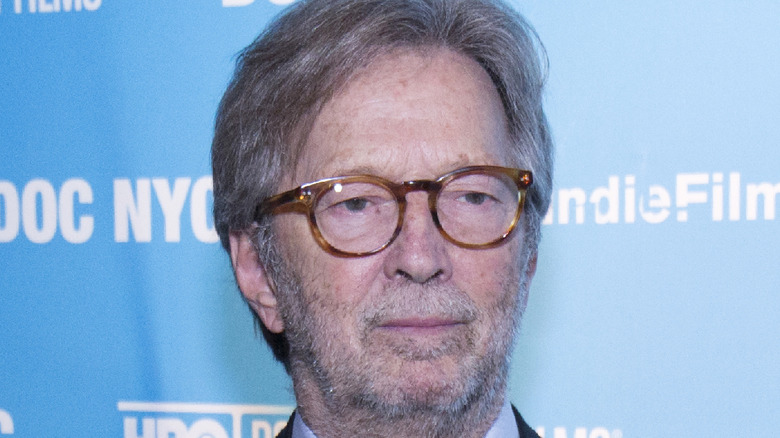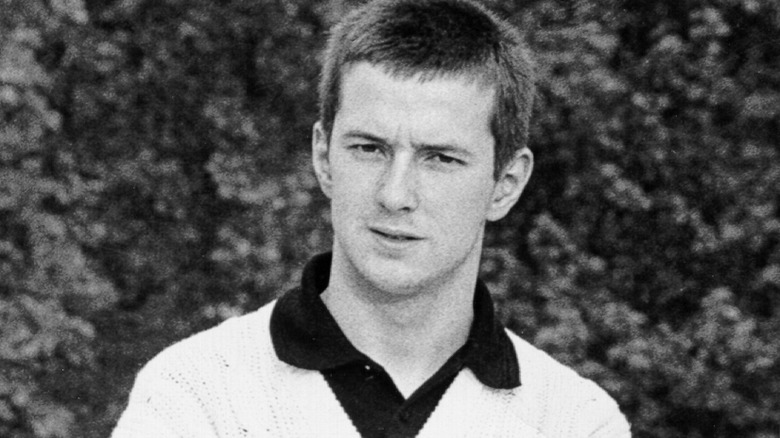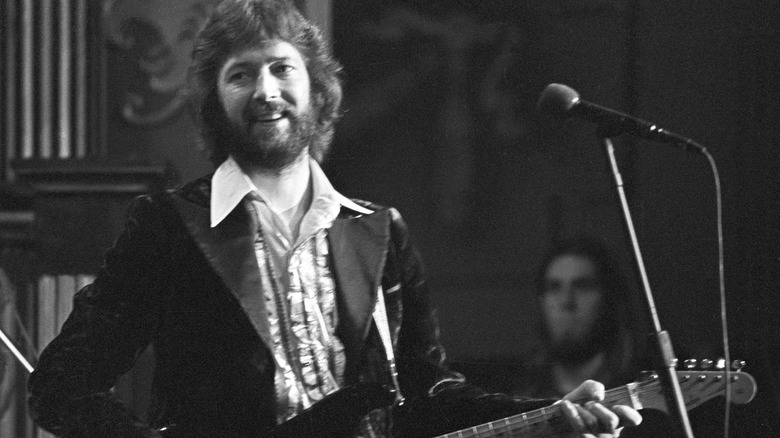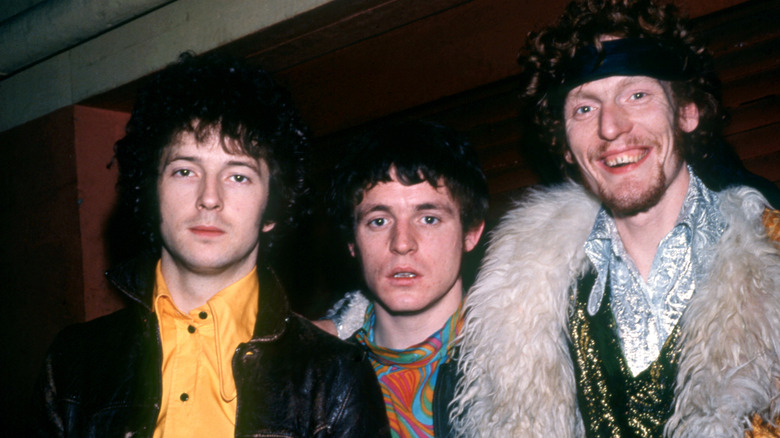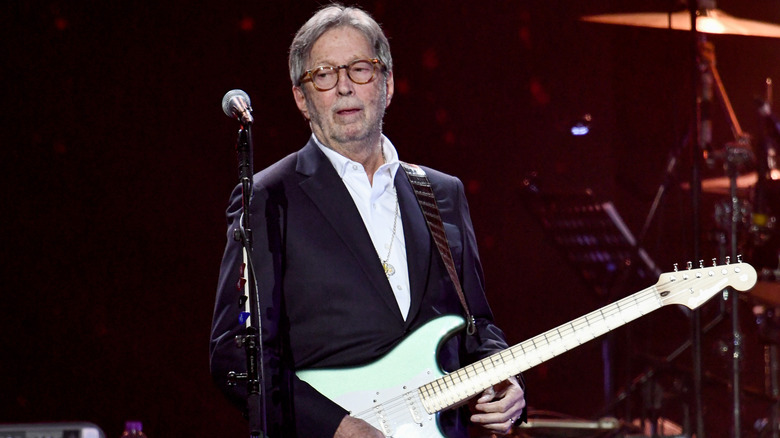Why Eric Clapton Is Loathed By Other Musicians
Whether you're talking about him as a solo artist or as a member of legendary bands like the Yardbirds, John Mayall and the Bluesbreakers, Cream, and Derek and the Dominos, Eric Clapton is one of the greatest, most talented musicians in rock 'n' roll history. Well before memes were a thing, the "Clapton is God" graffiti found in various places in mid-'60s London helped spread the word about his virtuosity, and while the man himself believes it was all a publicity stunt (via the Express), it's hard to argue that point, at least as far as his guitar-playing wizardry is concerned.
However, respect as a musician doesn't always equate to unanimous support from music fans. In 2007, The Guardian notably wrote that Clapton "is not God," and cited several examples of why this is arguably the case, including how he left the Yardbirds because they were no longer a blues/R&B purist band ... only to write radio-friendly schmaltz such as "Wonderful Tonight." And while he has several defenders among his fellow musicians, including several longtime associates (via The Washington Post), there are many others who have spoken negatively about him for a number of reasons. Here are some of the reasons why Eric Clapton is disliked by these performers.
He's been described as a difficult person in general
It's tempting to go off-tangent with all the examples of bands who made great music despite the members not having the best relationships with each other. But since we're talking about Eric Clapton, we should start by mentioning his contentious relationship with his bandmates in the Yardbirds — that same band he quit back in 1965 because he felt they were getting too poppy with the release of the would-be classic "For Your Love." According to Yardbirds drummer Jim McCarty, he and his bandmates were actually happy that Clapton left the group. "Eric had these R&B mod songs he wanted us to do," McCarty said, per The Guardian. "Him leaving was a relief. Eric would be sitting in the van not talking to anyone. You'd think he's so moody, he's such a pain, we're fed up with this."
In an extensive report on Clapton's recent controversies, The Washington Post wrote that singer Rita Coolidge, who helped write the plaintive piano outro of Derek and the Dominos' 1970 hit "Layla," found the guitarist hard to speak to when she complained that Dominos drummer Jim Gordon (her then-boyfriend, no less) took full credit for that part of the song. "I've never had a conversation with Eric about probably anything," Coolidge revealed to the outlet. "He always made me feel ... like I was beneath him."
Clapton's racist rant at a 1976 show angered fans and musicians alike
Being intoxicated should never, ever be an excuse for putting your foot in your mouth in a public setting. However, that is the accepted narrative framing Eric Clapton's infamous concert in Birmingham on August 5, 1976, where he reportedly let loose with a barrage of bigoted comments and expressed his support for Enoch Powell, a British politician known for his right-wing, anti-immigration views. There isn't any transcript to confirm what Clapton supposedly said on that night, but as Ultimate Classic Rock pointed out, "multiple sources" have backed up the allegations that a) he was wasted onstage and b) he was saying some unpleasant things about foreigners in Britain.
"I don't want you here, in the room or in my country," Clapton was quoted as saying. "Listen to me, man! I think we should vote for Enoch Powell. Enoch's our man. I think Enoch's right, I think we should send them all back." As alleged, he then followed this up with a string of racial slurs mostly directed against Black immigrants, claiming at one point that he "used to be into dope" but has since gotten "into racism."
Looking back on what he heard at the Birmingham show, English Beat frontman Dave Wakeling told Rolling Stone that he was shocked and offended by Clapton's remarks, which didn't go down well with much of the crowd. He also weighed in on the axeman's excuse that he was inebriated that night, and his repeated insistence that he isn't racist by nature. "We know that the drink doesn't make you make up sophisticated lies," Wakeling said. "It just makes you tell the truth too loud at the wrong time to the wrong people."
He's been accused of appropriating Black music and culture
Regardless of what Eric Clapton really said during the Birmingham concert, it was bad enough for photographer Red Saunders to get together with several friends and form the Rock Against Racism movement, which staged a series of concerts and similar events designed to spread awareness about the increase in racist attacks in Britain. RAR's founders also called out the guitarist in an open letter published by NME. "Come on Eric... Own up. Half your music is black. You're rock music's biggest colonist," the letter read in part, as quoted by The Guardian. RAR ended their message by referencing the fact that Clapton covered Bob Marley's "I Shot the Sheriff," writing, "P.S. Who shot the sheriff, Eric? It sure as hell wasn't you!"
In recent years, young musicians like Phoebe Bridgers and veterans such as Living Colour guitarist Vernon Reid have spoken about Clapton in similarly unflattering terms while taking stock of his past remarks and his purported appropriation of Black music. As quoted by The Washington Post, Bridgers called Clapton a "famous racist" who makes "extremely mediocre music," while Reid noted on social media that it's "important not to sidestep the curious phenomena of Racist With The Blues." The Guardian also noted how Clapton was a "serial borrower" who, outside of the actual music, grew a perm back in 1967 so that he could look more like Jimi Hendrix – notice how "Slowhand" sticks out in the band photo above with fellow Cream members Jack Bruce and Ginger Baker.
Clapton most recently ruffled feathers with his anti-lockdown, anti-vaxx music
At the time of this writing, major concerts and festivals are slowly returning after the COVID-19 pandemic put many major forms of entertainment on hold. Social distancing and mask-wearing became common practices, while many parts of the world were put on lockdown in order to slow the spread of the coronavirus. However, there were some people who seemingly didn't appreciate these safety protocols. These included Eric Clapton, who, in December 2020, teamed up with fellow classic rock icon Van Morrison to release the anti-lockdown song "Stand and Deliver," as reported by Billboard. Clapton would soon double down on his stance, releasing more anti-lockdown and anti-vaccine tunes and refusing to perform at venues that required attendees to provide proof of vaccination (via The Washington Post).
Needless to say, "Stand and Deliver" has gotten Clapton a lot of negative attention in the music world. Blues legend Robert Cray took issue with the references to slavery in the song's lyrics (as well as its overall sentiment) and opted against opening for the guitarist's upcoming tour; this also ended what had been a 35-year friendship between both men. "I'd just rather not associate with somebody who's on the extreme and being so selfish," Cray told The Washington Post. On a more diplomatic note, Sting told Agence France Presse (via Firstpost) that he "[doesn't] really understand the, uh, the science of the objection" when it comes to perceived anti-vaxxer musicians like Clapton and Morrison.
